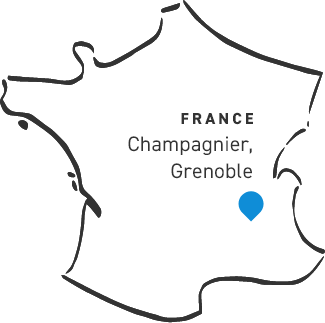Activities that meet CO2 emission standards
Transition to more responsible mobility solutions
Hydrogen development is part of an active worldwide strategy. In the context of urgent efforts to combat global warming, our core activity involves developing more responsible mobility solutions. While all employees adhere collectively to this guiding principle, our company's commitments do not stop here.
HRS has 15 hybrid cars and two hydrogen vehicles that our teams use for business travel.
To facilitate the transition of our teams towards more responsible mobility solutions, HRS will install a hydrogen refueling station at the new Champagnier industrial site, integrated in the regional station network. Electric vehicle charging points have also been installed in the staff car park.
In addition to shared access to transport, the installation of a bike shed and direct access to a cycle path linking the company to the centre of Grenoble mean employees can get to work safely and easily using this environmentally friendly mode of transport.
HRS aims to offer employees the option of more environmentally friendly mobility solutions in and around its production site.
A flexible working pattern
To reduce our employees' CO2 emissions, HRS has introduced remote working for its support teams as well as a four-day week for the production teams to reduce travel time between work and home.
With around a dozen employees based in the Lyon region, HRS has invested in the Wellio co-working space Wellio, to offer staff a comfortable working environment and further reduce daily travel time.
Prioritising local procurement
To reduce our CO2 emissions, wherever possible2, HRS works with local suppliers that meet the certifications applicable to our products. We must strive to use special materials, in particular to meet the permeability requirements linked to the use of hydrogen. If we are not able to find a suitable supplier in the Auvergne-Rhône-Alpes region, we prioritise French suppliers, followed by European suppliers.
We also aim to group our orders to reduce transportation linked to our raw material requirements. We only work with carriers from the Auvergne-Rhône-Alpes region.
In the near future, we are aiming to prioritise carriers who use fleets of hydrogen vehicles, which can be refueled with hydrogen during deliveries to our production site.
Distribution of suppliers
July 2023

An environmentally friendly industrial site
An environmentally responsible building
In addition to modifications made to ensure greener mobility, the Champagnier site has been designed to enable optimised energy management through the use of renewable energy sources. We opted to install solar panels on the workshop roofs, offering a capacity of 1.5 MW. The installation of large, glazed surfaces on the workshops reduces the need for artificial lighting. To optimise energy consumption, the lights are controlled by a clock with a presence sensor. In addition, no lights point towards the sky in order to prevent light pollution.
Plants have been carefully laid out and HRS has applied the recommendations of the CPAUPE (architectural, urban planning, landscaping, and environmental requirements) and consulted the LPO (French Bird Protection League) on the installation of dedicated spaces for animals in the area.
All measures have been taken to comply with . BREEAM Very Good certification
Optimising production activities
HRS has chosen to install an energy efficient machine fleet at its new site to reduce the energy consumed by the infrastructure.
Within the factory, each machine has been carefully located in order to minimise movement requiring mechanical handling, thereby reducing energy consumption.
Waste recycling
Our objective is to reduce our environmental impact through a global policy aimed at waste reduction and recycling.
We sort our wood, cardboard, plastic film, paper, metal (aluminium, stainless steel, steel) and electrical waste (cabling, copper, etc.), which is then sent to recycling centres.
We also decided a long time ago to dematerialise our documents (payslips, invoices and accounting documents, calls for tender, etc.), again with the aim of managing our environmental footprint and in accordance with applicable regulations.
As part of our ongoing commitment to reducing our environmental impact, we have launched a number of initiatives with the aim of achieving ISO14001 certification in 2025.